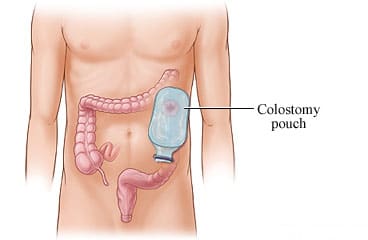
What is a colostomy?
A colostomy is surgery to make an opening in the skin on the belly and connect your bowel (colon) to that opening. The opening is called a stoma. The stoma may be needed for weeks to months. Or it may be needed throughout your life.
After surgery, stool will not leave your body through your anus. It will go through the stoma and into a plastic bag. The bag is attached to the stoma.
The surgery can be done in two ways. In open surgery, the doctor makes one large cut (incision) in the belly. In laparoscopic surgery, the doctor makes several small incisions in the belly. Then the doctor puts a thin, lighted tube and special surgical tools through the incisions. The tube is called a scope. It lets the doctor see your organs and do the surgery. In either surgery, the incisions leave scars. These will fade with time.
You may worry about life after this surgery. Many people with colostomies lead active, normal lives. It may help to know that the bags don't smell bad. They also don't show under clothes. Most people likely won't know that you have a colostomy unless you choose to tell them.
In the hospital, an ostomy nurse will help you learn to care for your colostomy. You will probably go home in a few days to a week. But it could take a month or so to fully recover.
How do you prepare for surgery?
Surgery can be stressful. This information will help you understand what you can expect. And it will help you safely prepare for surgery.
 Preparing for surgery
Preparing for surgery
- Your doctor will tell you about any bowel prep to follow if needed, such as if you should take laxatives, an enema, and antibiotics before surgery. Or you may need to go to the hospital the day before surgery to prepare your intestine.
- Be sure you have someone to take you home. Anesthesia and pain medicine will make it unsafe for you to drive or get home on your own.
- Understand exactly what surgery is planned, along with the risks, benefits, and other options.
- If you take a medicine that prevents blood clots, your doctor may tell you to stop taking it before your surgery. Or your doctor may tell you to keep taking it. (These medicines include aspirin and other blood thinners.) Make sure that you understand exactly what your doctor wants you to do.
- Tell your doctor ALL the medicines, vitamins, supplements, and herbal remedies you take. Some may increase the risk of problems during your surgery. Your doctor will tell you if you should stop taking any of them before the surgery and how soon to do it.
- Make sure your doctor and the hospital have a copy of your advance directive. If you don't have one, you may want to prepare one. It lets others know your health care wishes. It's a good thing to have before any type of surgery or procedure.
What happens on the day of surgery?
-
Follow the instructions exactly about when to stop eating and drinking. If you don't, your surgery may be canceled. If your doctor told you to take your medicines on the day of surgery, take them with only a sip of water.
-
Take a bath or shower before you come in for your surgery. Do not apply lotions, perfumes, deodorants, or nail polish.
-
Do not shave the surgical site yourself.
-
Take off all jewelry and piercings. And take out contact lenses, if you wear them.
At the hospital
-
Bring a picture ID.
-
The area for surgery is often marked to make sure there are no surgical site errors.
-
You will be kept comfortable and safe by your anesthesia provider. You will be asleep during the surgery.
-
The surgery will take about 2 to 4 hours.
-
You will have a colostomy bag attached to your stoma on your belly. Stool will leave your body through the stoma and go into the bag. Colostomy stool is usually softer and more liquid than normal stool.
-
After surgery, the bowel usually "rests" for a few days before it starts to work again.
-
You may have a thin plastic tube in your nose that goes into your stomach. It drains stomach juices and prevents nausea. The drainage usually looks green, brown, or even black with a bit of blood. This tube is usually removed after a few days. Then you can start to drink and eat again.
When should you call your doctor?
- You have questions or concerns.
- You don't understand how to prepare for your surgery.
- You become ill before the surgery (such as fever, flu, or a cold).
- You need to reschedule or have changed your mind about having the surgery.
Where can you learn more?
Go to http://www.healthwise.net/patientEd
Enter Q784 in the search box to learn more about "Colostomy: Before Your Surgery".
Current as of: October 1, 2025
Author: Ignite Healthwise, LLC Staff
Clinical Review Board
All Ignite Healthwise, LLC education is reviewed by a team that includes physicians, nurses, advanced practitioners, registered dieticians, and other healthcare professionals.

